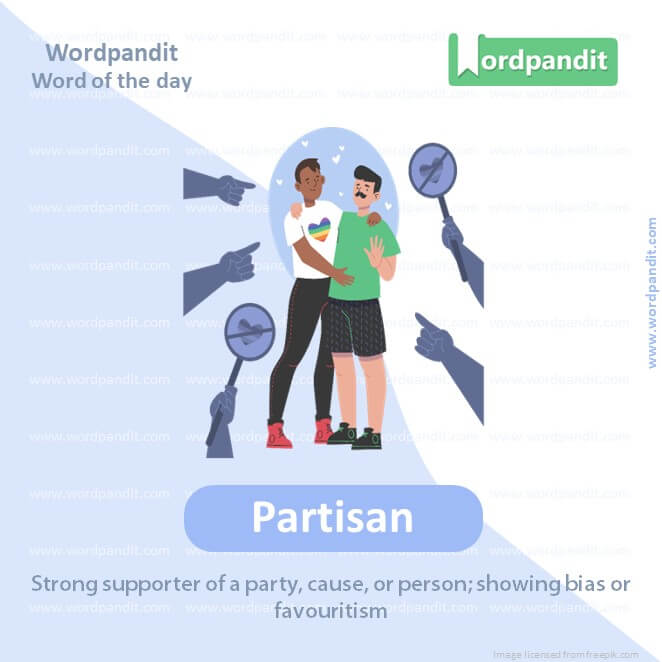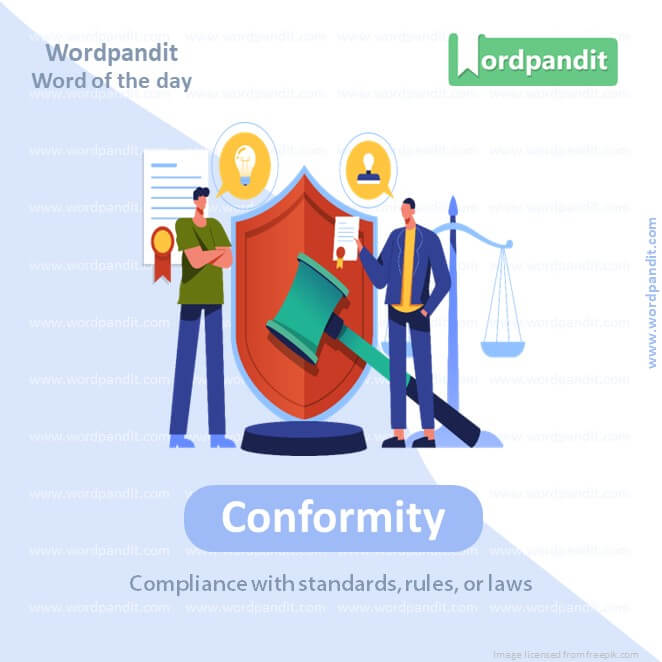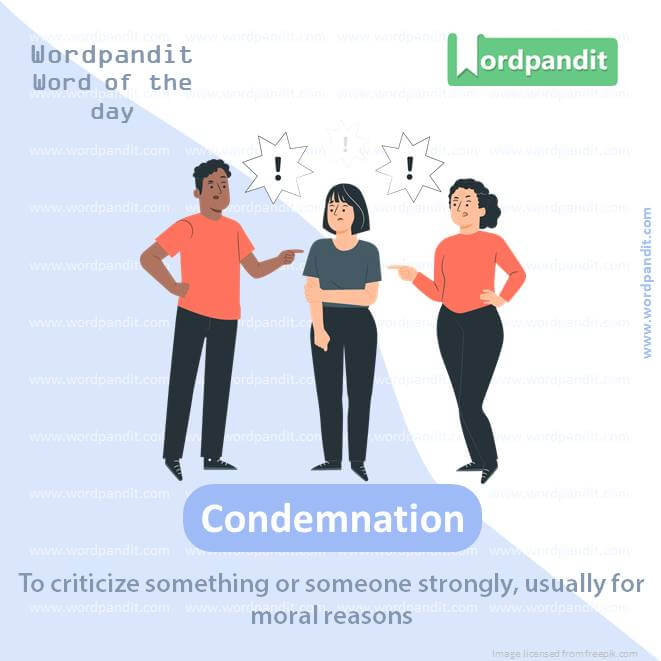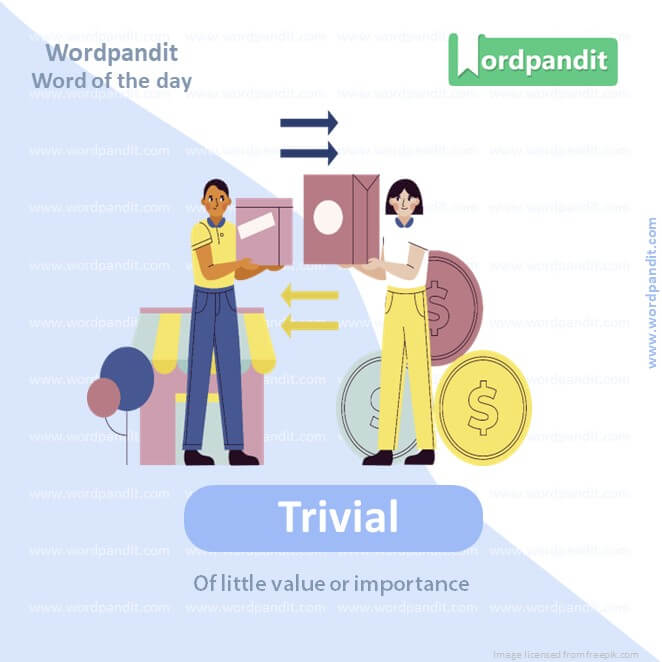Daily Vocabulary Words: List of Daily Used Words
Hi there. Welcome to this special section @ Wordpandit.
Our endeavour here is straightforward: highlighting important daily vocabulary words, you would encounter in The Hindu. This is your repository of commonly used words; essentially, we are posting a list of daily used words. Hence, this has significant practical application as it teaches you words that are commonly used in a leading publication such as The Hindu.
Visit the website daily to learn words from The Hindu.
WORD-1: ESTEEMED
CONTEXT: Dr. Sharma, an esteemed scientist in the field of molecular biology, was invited to deliver the keynote speech at the conference.
SOURCE: The Hindu
EXPLANATORY PARAGRAPH: Imagine you have a toy that you really love and respect. You think it’s the best toy ever! That’s how people feel about someone who is esteemed. It means that the person is highly respected and admired by others because they’re really good at what they do or because they’ve done something amazing.
MEANING: Highly respected and admired by others (adjective).
PRONUNCIATION: es-TEEMD
SYNONYMS: Honored, revered, respected, admired, valued, regarded, appreciated.
USAGE EXAMPLE:
1. The esteemed scientist won many awards for his discoveries.
2. She is an esteemed author with many bestselling books.
3. The school was honored to have an esteemed guest speak at the event.
4. His opinions are highly esteemed in the community.

WORD-2: MARAUDING
CONTEXT: Villagers were on high alert after a marauding group of wild elephants was reported to have wandered into farmlands.
SOURCE: The Hindu
EXPLANATORY PARAGRAPH: Imagine pirates who go around looking for treasure and taking things that don’t belong to them. “Marauding” is a bit like that. It means going around and causing trouble, often taking things or hurting others.
MEANING: Going about in search of things to steal or people to attack (adjective).
PRONUNCIATION: ma-RAU-ding
SYNONYMS: Pillaging, raiding, looting, rampaging, ransacking, plundering, preying.
USAGE EXAMPLE:
1. Marauding bandits attacked the village at night.
2. The farmer was worried about marauding animals eating his crops.
3. The city prepared defenses against marauding invaders.
4. The villagers lived in fear of marauding pirates.
WORD-3: RAGGED
CONTEXT: The refugees arrived at the border, their clothes ragged and their feet sore from their perilous journey.
SOURCE: The Hindu
EXPLANATORY PARAGRAPH: Imagine a teddy bear that’s old, with its fur coming off and stitches showing. That teddy looks “ragged.” It means something looks worn out, torn, or not in the best shape.
MEANING: Looking old and torn (adjective).
PRONUNCIATION: RAG-ed
SYNONYMS: Tattered, worn, frayed, shabby, threadbare, battered, scruffy.
USAGE EXAMPLE:
1. His ragged jeans had seen better days.
2. She gave a ragged sigh of exhaustion.
3. The book’s ragged edges showed its age.
4. The flag waved, ragged and torn, in the wind.

WORD-4: PARTISAN
CONTEXT: The debate in the parliament turned heated as partisan views clashed over the proposed economic reforms.
SOURCE: The Hindu
EXPLANATORY PARAGRAPH: Imagine you’re on a team and you really want your team to win. You cheer only for your team and not the other. That’s being “partisan”. It means supporting one group or side very strongly.
MEANING: Strong supporter of a party, cause, or person; showing bias or favouritism (adjective).
PRONUNCIATION: PAR-ti-zan
SYNONYMS: Supporter, follower, advocate, fan, devotee, loyalist, enthusiast.
USAGE EXAMPLE:
1. The audience was filled with partisans of the home team.
2. The news channel has been accused of taking a partisan approach.
3. As a partisan of environmental causes, she always recycles.
4. The meeting turned heated due to the strong partisan feelings present.

WORD-5: CONFORMITY
CONTEXT: The new city bylaws emphasize conformity to architectural aesthetics, hoping to create a harmonious skyline.
SOURCE: The Hindu
EXPLANATORY PARAGRAPH: Imagine everyone in class drawing the same picture because that’s what the teacher said. That’s “conformity”. It’s when everyone does the same thing or behaves the same way because it’s what’s expected or accepted by most people.
MEANING: Compliance with standards, rules, or laws (noun).
PRONUNCIATION: con-FORM-i-tee
SYNONYMS: Compliance, adherence, obedience, uniformity, compliance, alignment, agreement.
USAGE EXAMPLE:
1. The company emphasizes conformity to its rules.
2. She dressed in conformity with the latest fashion.
3. There’s a certain level of conformity expected in school.
4. The neighborhood displayed a striking conformity in house designs.
WORD-6: DISCARDED
CONTEXT: Discarded plastic bottles, strewn across the beach, serve as a grim reminder of the environmental challenges we face.
SOURCE: The Hindu
EXPLANATORY PARAGRAPH: Imagine you have a broken toy and you put it in the trash because you don’t want it anymore. That’s “discarded”. It means throwing something away because it’s no longer wanted or needed.
MEANING: Thrown away or gotten rid of because it’s no longer useful or wanted (verb).
PRONUNCIATION: dis-KAR-ded
SYNONYMS: Thrown out, dumped, abandoned, disposed of, jettisoned, cast off, ditched.
USAGE EXAMPLE:
1. Discarded wrappers littered the park.
2. She discarded her old shoes after buying a new pair.
3. The idea was discarded after much consideration.
4. I found a beautiful vase in a pile of discarded items.

WORD-7: CONDEMNATION
CONTEXT: The brutal attack on the journalist received widespread condemnation from both and international communities.
SOURCE: The Hindu
EXPLANATORY PARAGRAPH: Imagine someone telling you that what you did was really bad and wrong. That’s “condemnation”. It’s a strong way of saying that something is not good or not right.
MEANING: To criticize something or someone strongly, usually for moral reasons (noun).
PRONUNCIATION: kon-dem-NAY-shun
SYNONYMS: Censure, criticism, rebuke, denunciation, reproach, reproof, blame.
USAGE EXAMPLE:
1. The mayor’s actions drew condemnation from the public.
2. The article was a condemnation of corrupt practices.
3. He expressed his condemnation of the violence.
4. The building was marked for condemnation and would soon be demolished.
WORD-8: GUISE
CONTEXT: The scam artists operated under the guise of legitimate investors, duping many into parting with their savings.
SOURCE: The Hindu
EXPLANATORY PARAGRAPH: Imagine dressing up as a superhero for Halloween. Even though you’re pretending to be someone else, you’re still you underneath. That superhero look is a “guise”. It’s like a disguise or a way something appears, even if it’s not really that way.
MEANING: An external appearance or manner that hides the true nature (noun).
PRONUNCIATION: GYZE
SYNONYMS: Disguise, pretense, facade, mask, appearance, semblance, cover.
USAGE EXAMPLE:
1. He visited the city under the guise of a tourist.
2. The villain approached in the guise of a friend.
3. The project, under the guise of charity, was actually a scam.
4. They sold low-quality products under the guise of luxury items.
WORD-9: UNEVIABLE
CONTEXT: With the changing global market dynamics, many traditional industries are finding their business models uneviable.
SOURCE: The Hindu
EXPLANATORY PARAGRAPH: Imagine a game that’s really hard to win, almost impossible. That game is “uneviable”. It means something isn’t likely to work out or succeed.
MEANING: Not capable of working successfully or not feasible (adjective).
PRONUNCIATION: un-EV-ee-a-bul
SYNONYMS: Unworkable, impractical, infeasible, impossible, unattainable, unrealistic, unachievable.
USAGE EXAMPLE:
1. The plan seemed uneviable due to lack of funds.
2. The team realized the project was uneviable and decided to cancel it.
3. Pursuing such an uneviable dream can lead to disappointment.
4. Given the constraints, the proposal is uneviable.

WORD-10: Trivial
CONTEXT: Critics argue that focusing on such trivial issues diverts attention from the larger, more pressing concerns of the nation.
SOURCE: The Times of India
EXPLANATORY PARAGRAPH: Imagine you drop a tiny crumb on the floor and your friend says, “Oh no! A huge mess!” They’re joking because a tiny crumb isn’t a big deal. When something is small or not very important, we say it’s “trivial.”
MEANING: Of little value or importance (adjective).
PRONUNCIATION: TRIH-vee-ul
SYNONYMS: insignificant, minor, petty, negligible, unimportant, slight, small.
USAGE EXAMPLE:
1. Don’t worry about such trivial matters.
2. The game was just for fun, so the mistakes were trivial.
3. They spent the afternoon discussing trivial topics.
4. The differences between the two designs are trivial.
vocabulary learning app
Immersing oneself in a new language or enhancing one’s word pool in native tongue is a demanding undertaking. However, recent advancements in technology have provided an efficient solution to this endeavor: the vocabulary learning app. Embracing this digital tool can not only broaden your lexicon but also refine your language proficiency in an intriguing manner.
The crux of any vocabulary learning app lies in its ability to simplify complex language constructs and present them in an engaging and digestible format. Competitive apps offer features like flashcards, quizzes, and games that make learning less academic and more leisurely. Whether you’re a student struggling to learn English vocabulary or a language enthusiast eager to master Spanish, the vocabulary learning app serves as a robust platform to meet your linguistic goals.
Learning with a vocabulary learning app should be a systematic and consistent process. Starting with easy levels and gradually progressing to complex words allows for a steady language learning journey. Many learners make the mistake of rushing through levels which eventually results in an unclear understanding of words.
Interactivity defines the efficacy of any vocabulary learning app. Studies show that one learns faster and retains knowledge longer when they interact with the learning material. Therefore, effective use of the vocabulary learning app involves actively engaging with its various features – be it pronunciation guides, image associations, or sentence formulation exercises and repeating words or phrases until they resonate with you.
Another vital aspect of learning with a vocabulary learning app is consistent review and reinforcement. Periodic revision strengthens the neural connection, reinforcing the word memory in your mental database. Hence, make sure to set aside specific review periods within your app.
In summary, a vocabulary learning app shines in its capacity to make language learning engaging and accessible. But the value one derives from it essentially depends on how one uses it—gradual progression, active interaction, and consistent reviews form the pillars of a fruitful vocabulary learning exercise. This modern tool is an effervescent blend of convenience and comprehensiveness, making vocabulary expansion a delightful venture rather than a daunting task.







